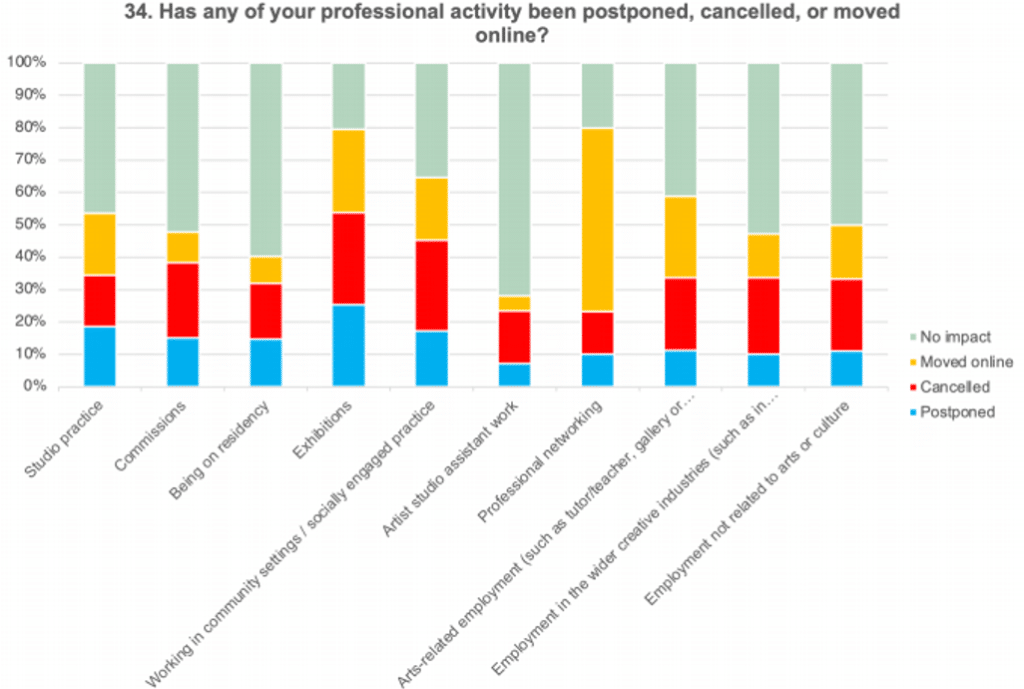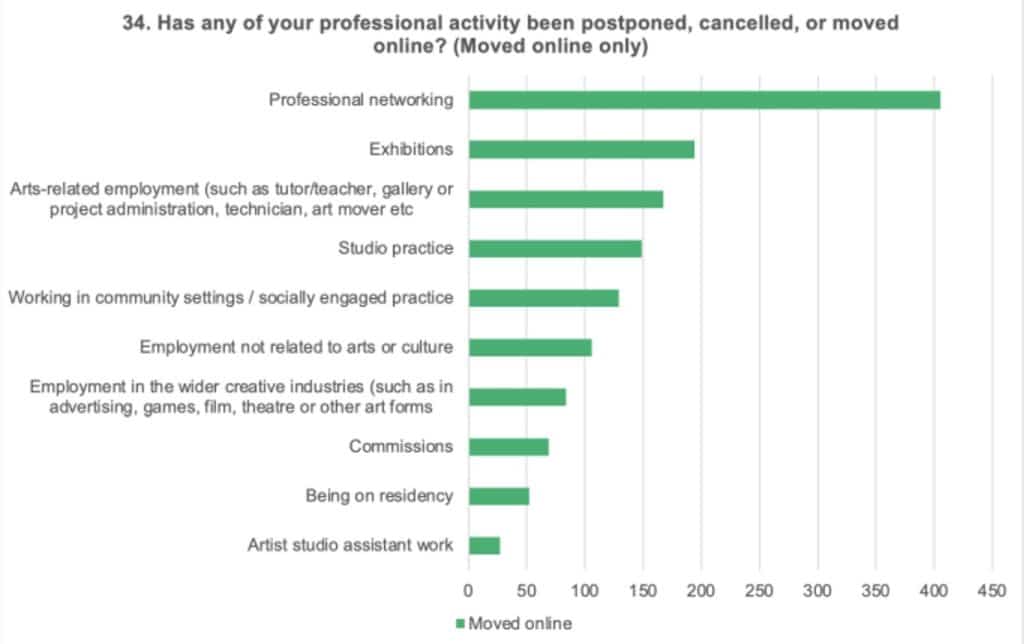Understanding how artists can adapt their practice for sustainable income on their own terms.
Adaptations began as a pilot workforce development grant for three visual artists in spring 2021. It was intended to support artists find new sustainable ways of working in the wake of the COVID-19 pandemic. Awardees were selected through open call for artists across England. Three awards of £3,000 each were made:
- Emma Edmonson and Lu Williams (Southend) tested Dog Ear, a new collaboration to create and sell editioned art works that were also dog toys. They sought a self-sustaining practice that avoids public funding and arts hierarchies and to bring their work to a new audience.
- Libby Heaney (London), an artist with a digital practice, worked with her local community on her housing estate’s allotment. She wanted to reconnect with her physical environment and, through community work, residents co-commissioned a mural for the estate.
- Tamara Stoll (London) researched collective and collaborative approaches to self-publishing, developing The Road Less Travelled press. She made online resources to help others do similar work. Her project experimented with physical material and local distribution networks, in particular ‘the street’ as a delineator of local community.
Alongside the grants, we asked artist researcher Dr Manca Bajec to reflect with the artists on their motivations and opportunities for change. Through regular conversations she identified common concerns and key questions to inform Adaptations in 2022.
Artist incomes and activity during 2020
Our data from the first year of the pandemic (n = 1444) showed:
- A significant drop in artist earnings.
- Less time spent on professional activity earning money.
- The cancellation or postponement of key opportunities such as exhibitions, residencies and professional networking.
- Over half of applicants reported spending less time on professional activities (with the exception of time spent on studio practice which saw an equal split of approximately 35% of artists spending the same, or more time making work).
- Over 50% of awardees reported lower earnings across all income streams.
- Much activity that went ahead during this period was transferred online, whether or not the activity or the artist suited this transfer. Many artists were forcing onto digital platforms that might not suit them.






Making more sustainable arts practice
Dr Bajec identified common approaches from the awardees:
Independence and autonomy of practice
- Awardees considered how artists can surpass the models set in place by galleries and institutions to become financially self-sufficient.
Collaboration and community
- Projects sought ways of using practice to connect with peers and the communities of which artists are a part. Some of the artists looked to pass this on by aiming to commission other artists in future. Significantly, the projects often looked to connect directly with local people instead of the art world, drawing on existing local networks.
Development and transfer of skills into new settings
- All the awardees were interested in developing new skills, and/or transferring their existing skills into new contexts. Business skills, working with new materials, new non-arts markets for art works, self-publishing, education workshops, commissioning, arts management and facilitation all featured strongly. Inevitably, the artists developed new skills in digital practice and technology.
Values and social change
- At a time of reflection and reassessment of core societal values, awardees thought about the meaning of their practice and how it fit in the wider world. Reused and recycled materials featured in many projects, as did a desire to step away from an exclusionary art system that did not allow middle and working class people to collect, own, or purchase artworks. Most also cultivated an interest in socio-politics, mutual care, activism, sustainable and ethical modes of production, outsider publishing culture, and more accessible forms of knowledge.
The physical
- While, or perhaps because, much of life during lockdown moved onto digital platforms, all three awardees displayed a commitment to re-engage with the physical despite the pandemic, finding ways around it that are safe. More broadly applications for the award proposed the use of empty shops and similar spaces the public could access, or sited work outdoors. Safe and socially distanced forms of public engagement such as walking were also used.
Further research from Adaptations
We are developing ideas and projects around:
Alternative business models
With artists facing reduced income, fewer opportunities and greater competition for funding, our learning from Adaptations suggests artists need support in establishing new business models and income streams to support their practice:
- Identifying and utilising transferable skills to apply across different sectors.
- Understanding how art objects, practice and labour behaves and is valued in other markets and contexts.
- Mixed models of practice to further diversify income to make practice more resilient.
New audiences
Artists need help in understanding and engaging new audiences – their local communities, outside of arts organisations. Although moving their activity online might not be desirable to all artists, the reliance of many on digital communications during the pandemic cannot be ignored by those with the resources to engage[i]. Future Adaptations need to help us better understand how artists core interests can connect with new audiences, particularly those not already engaged in the arts.
Award models: the open call
Evaluation of all our projects has led us to question our own selection processes through our research project Tender. Specifically related to Adaptations, the award may be more helpful to artists if structured to provide longer-term support, acknowledging the time and reflection it takes for artists to develop new ways of working. Our research residency models may prove useful in thinking this through.
Social responsibility
As the social-over-artistic concerns of the Adaptations awardees show, there is a hunger to understand how practice intersects with the wider systems at play in the world. Questions around climate change, social justice, equity and how we perpetuate or can resist these systems is a core consideration threaded through all Artquest programming. New resources around sustainability (with artists experiences in sustainable practice already commissioned) and peer support for artists with activist practices are in development for 2022.
Get in touch
We are actively looking for organisations with shared interests to develop shared projects. Contact Nick Kaplony for a conversation on working with us.
[i] 10m people in the UK lack basic digital skills, and a further 14.9m report a very low digital engagement (see https://www.goodthingsfoundation.org/insights/building-a-digital-nation/). Digital cannot replace physical events, but could provide new opportunities for some.
